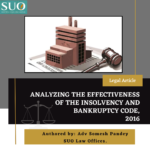START-UPS VENTURES ON THE GLOBAL STAGE: DECODING THE LEGAL AND REGULATORY COMPLEXITIES
INTRODUCTION
The startups culture has established a prominent reputation globally for its contributions to the growth and development of a countrybe it in terms of innovation, introduction of new products or services, generating employment, driving economic growth, etc. However, in relation to establishing a startup, as basic as it might appear, the practicality is not that seamless and concerns a wide array of legal and regulatory complexities to be navigated,so as to ensure a smooth incorporation and functioning of the company. The challenges can range from; complex regulatory processes, selection of the right business structure, to safeguarding the intellectual property rights,among others. It is thus crucial for the startups to possess a fair understanding of these roadblocks to overcome them efficiently, as these significantly impact the growth of the business in the long run. Legal and regulatory compliances are pivotal for the success of a startup and must not be overlooked; failure to ensure the same may cost the startup with delay in its growth and other constant issues. This article delves into the intricacies of the complex legal and regulatory landscape confronting startups worldwide along with providing strategies to address these challenges.
Moving further, let’s scrutinize the legal and regulatory hurdles frequently encountered by the start-ups all across the world, especially in the developing countries;
LEGAL AND REGULATORY COMPLEXITIES
- The Regulatory Environment: Under developed or complex regulatory framework is one of the fundamental hurdles met by startups, wherein it has a lack of clarity and inconsistency. The regulations governing the business registration, taxation regime, employment standards, industry specific business licenses to be acquired, can often leave space for ambiguity or is subject to constant evolvement. This uncertainty may lead to delays in the company’s operations, increase in costs, and inefficiencies. Thereby, hindering the progress and scalability of the startups. To address this, the startups must begin to prioritise the local compliances and regulations and engage with legal professionals to avail guidance on compliance requirements.
- Safeguarding Intellectual Property (IP): It is another critical concern for the startups operating worldwide. It is a significant asset for the startups particularly for those leveraging innovative technologies. Startups often run the risk of IP infringement, unauthorised use of trademarks, counterfeiting, etc. Enforcement of these rights is quite a challenge in the developing countries wherein the Intellectual Property laws may not be as robust. To ensure that their IP assets are adequately secured, the startup founders must get their patents, trademarks and copyrights registered, where it is applicable, getting the necessary expertise and guidance from IP lawyers would ensure their enforcement of IP rights is an effective manner.
- Access to Funding and Investment:Limited access to funding and investment poses a major constraint to thestartups. It is particularly a roadblock in the developing economies where the availability of venture capital, angel investors funding is limited, the banking regulations are stringent, and the risk adverse investors further constrain the access to funding opportunities for startups. Diverse funding sources must be explored by the startup founders to overcome this hurdle, such as, government grants, crowdfunding platforms, impact investment funds, etc. Forming amicable relationships with the local and international investors, networking by way of events, conferences, and summits also enlarge the platform for funding opportunities for startups.
- Selection of Business Structure: It is one of the most crucial decisions which has to be made by a startup founder as it directly impacts various other aspects of the company, including the taxation regime applicable, legal liabilities and the level of control the founder has over the business, number of founders, etc. There are several business structures to select from including Sole Proprietorship, Limited Liability Companies, One Person Companies, Private Limited Companies, etc. The requirements for different business structures must be distinct across different countries. The startup founder must choose the business structure after a careful analysis of the advantages and disadvantages that every distinct structure come with. To make an informed decision on the same, consultation from a legal or business advisor must be availed so as to avoid any potentially huge legal risks in the long run.
- Compliance and Operational Risks: The startups running business operations in developing countries encounter complexities with reference to compliance given the increased bureaucratic inefficiencies, inconsistency in enforcement of regulations, pervasive corruption risks, etc. The consequence of non- compliance of which can be legal fines and penalties, damage of goodwill and reputation, it can even go as extreme as business closures. It is highly essential to mitigate these compliance risks to build trust and credibility. To navigate through this hurdle effectively the startups should give priority to transparent and ethical business practices and must uphold their integrity, it must implement vigorous internal controls, conduct regular audits, and foster a culture of compliance within the organisation.
- Technological Constraints: Technology plays an instrument role when it comes overcoming legal and regulatory complexities globally. With an increase in digitisation, the startups have begun to embrace technological solutions for the purposes of registration of businesses, taxation compliance, regulatory reporting, which has in turn streamlined the administrative processes and has helped in reduction of the compliance costs. The startups should leverage the use of technology in every possible way which enhances the transparency and accountability in its operations. This may include the use of blockchain technology, digital identity solutions, which accelerates the trust and security while also minimising the regulatory risks.
- Agreements and Contracts:Contracts and agreements are of paramount importance to the startups with regards to maintaining and building business relationships with clients, business partners, shareholders, suppliers, etc. These can cover various issues including terms of payment, confidentiality, non-compete, penalties, delivery of goods and services. An ill-drafted contract or agreement usually pose risks to the startup’s performance and overall discharge of their services, thereby costing them their business. The startup founder should ensure that the terms of the agreements and contracts are well drafted and define clearly the nature of relationship, duties, liabilities, etc, of the parties involved. To ensure the legal enforceability of these agreements and their compliance with the relevant laws is extremely important, consulting and experienced lawyer must be considered to advise and protect the business interests of the startup.
The afore-mentioned points provide an insight into the practicalities of the otherwise attractive façade of establishing as startup, to unlock their potential to the fullest, thesecomplexities cannot be overlooked and must be tackled proactively to thrive into the dynamic economies.
Having a fair understanding of these challenges, now let’s further take a glance at the success stories of the startups who have been successful in navigating through these issues and have continued to take their success graph upwards;
SUCCESS STORIES
Stories of these widely used apps like Airbnb, Spotify, Uber, Ola, among other startups which time and again have faced hurdles in the way of smooth operations of their businesses but have managed to hold their position in the markets provides us with a practical picture, that while these challenges may seem daunting, however, it is very much possible to overcome them by an effective approach and adoption of agile business practices.
- Airbnb: A widelyused simple platform for accommodation, founded in the year 2008, which transformed the hospitality industry entirely, while challenging the stereotypical norms of accommodation, and has been growing ever since. It had to navigate through a number of complexities to find and hold its position in the market, starting with gaining the credibility and trust of its users, for which an implementation of the process of verification was done by them, both for the hosts and guests, thereby providing security to its users. It also was struggling with an increase in evolving restrictions and regulations of rental prices, increase or decrease in tourism, shortage of housing, stringent rules in different countries. Despite all these roadblocks, it has successfully managed to thrive and maintain its success.
- Spotify: A music streaming platform founded in the year 2006, and is undeniably one of the most popular and established music application across the world. Challenges faced by Spotify include negotiations of the licensing deals with various record labels, to steer through this hurdle, it made use of data and analytics in order to gain a better understanding of the ever-changing consumer behaviour and in in turn negotiate deals in a profitable way. Apart from this. Access to funding and use of technology to provide a seamless user experience also contributed to its growth.
- Uber: Founded in the year 2009, a widely used application for transportation needs faced a number of regulatory complexities given their operations spread across in different countries and cities. Uber made use of technology to get in contact with the local authorities and ensured compliance with their legal regulations to overcome that obstacle. It also consistently leverages technology to enhance user experience, by providing a convenient access to bookings, data collection for the behaviour and conduct of its drivers, navigation for routes, providing timelines for pick up and drop etc. The company has successfully navigated through these hurdles to maintain its success.
CONCLUSION
Startups are time and again confronted with a range of legal and regulatory complexities worldwide, especially in the developing countries, which they need to navigate through carefully. Despite all these obstacles, startups have an opportunity to thrive and build their successful businesses in the dynamic market. Embracing these challenges and working on their solutions is the correct path which needs to be followed, this involves understanding the legal framework, local regulations, business or industry specific requirements, prioritizing compliance, leveraging technology driven solutions, keeping their agreements in check and relying on professional business and legal advice where it is essential. While a startup is an attractive idea, its implementation takes a careful analysis of the legal and regulatory framework. The startups can successfully manoeuvre the above mentioned challenges, it just requires adaptability and a proactive approach towards compliance, which will ensure the risks are minimised, opportunities are seized and the startup is driven towards a long-term success.
Authored by: Adv Nemat Budhiraja



